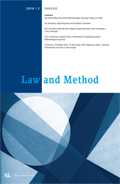|
This article discusses the key methodological shortcomings of experimental regulations and regulatory sandboxes. I argue that the poor design and implementation of these experimental legal regimes have both methodological and legal implications. The deficient design of experimental regulations and regulatory sandboxes can have three adverse effects: First, the internal validity of experimental legal regimes is limited because it is unclear whether the verified results are the direct result of the experimental intervention or other circumstances. The limited external validity of experimental legal regimes impedes the generalizability of the experiment. Second, experimental legal regimes that are not scientifically sound make a limited contribution to the advancement of evidence-based lawmaking and the rationalization of regulation. Third, methodological deficiencies may result in the violation of legal principles which require that experimental regulations follow objective, transparent, and predictable standards. I contribute to existing comparative public law and law and methods literature with an interdisciplinary framework which can help improve the design of experimental regulations and regulatory sandboxes. I draw on social science literature on the methods of field experiments to offer novel methodological insights for a more transparent and objective design of experimental regulations and regulatory sandboxes. |


Law and Method
About this journalSubscribe to the email alerts for this journal here to receive notifications when a new issue is at your disposal.
December, 2021
Expand all abstracts
| Artikel |
|
| Keywords | experimental regulations, regulatory sandboxes, methodology, regulatory quality |
| Authors | Sofia Ranchordás |
| AbstractAuthor's information |

 Issue 12
Issue 12